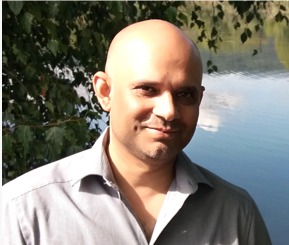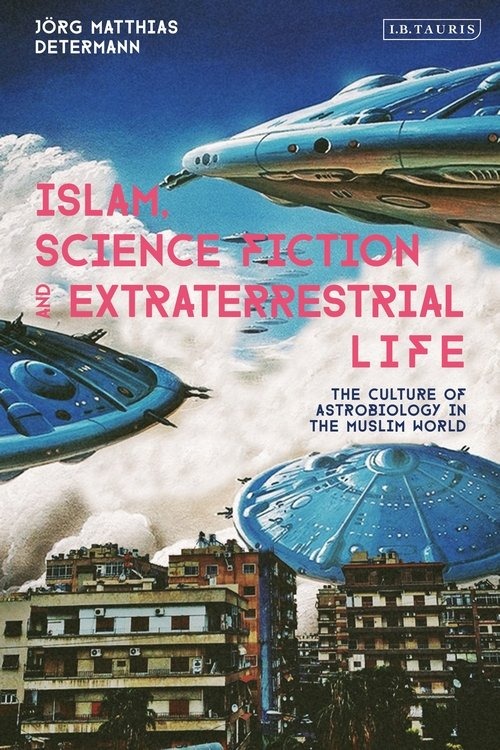Spaceships coming down from the sky and flying through clouds provide a charming but frightful view as if Earth is under attack by aliens. This is the first impression from the cover of an excellent book — Islam, Science Fiction and Extraterrestrial Life — written by Jörg Matthias Determann. In his latest book, Determann discusses the culture of astrobiology in Muslim societies and presents a thorough analysis of the usage of different media genres to exhibit ideas about extraterrestrial life. In this regard, as the author steps from one chapter into another, the core concept of alien perception in Muslim societies is described extremely well concerning the science fiction propagated through magazines, films, newspapers, books, and journals.
Mankind seeks a satisfactory answer to the most intriguing question throughout history: are we alone in the universe? Ancient civilizations, societies, and religions had different beliefs about extraterrestrial life, as did the modern Islamic world. Over time, people have adopted new ways of thinking to solve their problems. Still, the mystery of aliens’ existence remained unsolved, and this question became even more controversial in some societies.
With the advent of modern sciences, astrobiology is recognized as a multidisciplinary science field to address the unending question of the search for alien life. Though this discipline of science is not so far widely acknowledged in Muslim worlds, nevertheless, it is not any more an unheard field, as explored in-depth in this book.
Determann encompasses different concepts of the alien in Muslim societies across the globe, from South Asia to Turkey and Arabia to Africa. In these countries, people have shaped ideas about alien life according to their own geopolitical situations and religious beliefs.
The author tries to connect different genres of media with the culture of astrobiology in these societies. In general, the book covers various ideas: the imagination of aliens in Muslim societies, expressions of science fiction for describing the political landscape, research of Muslim scientists in the field of astrobiology and the origin of life, work of science fiction writers, concepts of extraterrestrial life in Quran, author’s opinion on different astrobiological concepts in Islam and the use of media in science fiction.
The book provokes the reader’s interest in different aspects of Muslim societies. It provides insights into the concepts of alien life among Muslims and their history, culture, and religion. The opening chapter beautifully connects the concept of alien worlds within Muslims in the context of the Quran’s first chapter, “The Opening,” where God is mentioned as “the Lord of Worlds.” It clearly points out the existence of many worlds according to various commentaries on the Quran, including the very famous and reputable “Tafhim Ul Quran” by Syed Abul A’la Maududi.
The book interestingly mentions the Quran as the first version of science fiction in Islam based on the context that the Quran promotes the plurality of worlds. It also contains thought-provoking quotes on the existence of alien and other worlds from various renowned Muslim scholars belonging to different sects of Islam. It sheds light on certain potential words in the Quran that could suggest the existence of extraterrestrial life and possibly pave the way towards Islamic science fiction.
Determann widely employed the culture of science fiction to depict political scenarios and even political unrest in Muslim societies.
For instance, he discusses Ayham Jabr from Syria, who rated the ongoing Syrian war as a foreign agenda and as if peacekeeper forces are alien that has invaded their country. The book also outlines the aspects of science fiction and how it led to the competition in intra-religion, e.g., Christianity, and inter-religion, e.g., Islam and Christianity.
The theme of science fiction of extraterrestrial life in Muslim worlds is influenced by mainly two factors: politics and religion. The book does a good job of narrating the evolution of scientific thoughts in different civilizations. Ruling elites in Muslim countries have varying desires, ranging from imposing sanctions on scientific thoughts in some parts and, on the contrary encouraging scientific debates by facilitating conferences and open discussions in other parts. The author has raised questions about the lack of science fiction movies and literary work in certain Muslim-majority countries and if this could be related to the influence exerted by political and/or religious leadership as well.
Further, UFO’s perception in Muslim countries and its controversial controversies and related movements are also addressed at great length.
Islam, Science Fiction, and Extraterrestrial Life argue how extremism in certain Islamic worlds still fails to influence Muslim cultures’ scientific futurism. Various renowned scientists in space exploration originate from the Muslim world, and a significant number of scientists migrated to Western countries due to the lack of resources in their country of origin and certain religious sanctions. However, many Muslim countries are still progressing in space sciences, including but not limited to UAE, Qatar, and Pakistan.
Hereby, Determann also mentions different efforts made in Muslim countries to promote astrobiology, science fiction, and the art of scientific thinking, for instance, the volunteer organization Astrobiology Network of Pakistan (ABNP). The promotion of astrobiology through science fiction in Muslim societies will help to bring open-mindedness, an atmosphere of constructive dialogues on various issues, and a culture of critical thinking among people, according to the Astrobiology Network of Pakistan (ABNP).
In this book, the author provides further ideas of research on different aspects of Muslim societies, including politics, science, and the use of different media genres and introduces the great work of Muslim scholars that can be a source of inspiration for Muslim youth.
Also, read; Book review, Brief Answers to the Big Questions

Dr. Nozair Khawaja is a planetary scientist working at Freie University Berlin, Germany, and associated with multiple space missions. He is a science team member of NASA’s Cassini at Saturn and Co-investigator of a dust instrument onboard JAXA’s Destiny Plus at Phaethon space missions. Dr. Khawaja is also associated with NASA’s future space mission Europa-Clipper.
The main work of Dr. Khawaja is to explore extraterrestrial oceans in the outer Solar System to find signs of life there. He is a first as well as a contributed author in many breakthrough pieces of research published in Nature, Science, MNRAS, and Astrobiology journals.
Dr. Nozair Khawaja is also the founder of Astrobiology Network of Pakistan (ABNP) to promote astrobiology in Pakistan, a science communicator, and a writer.

